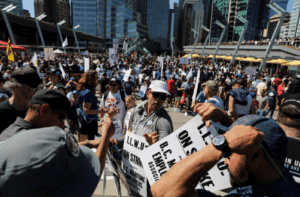
Negotiations to Resolve the Canadian Port Strike Resume
Negotiations have resumed between striking dockworkers and port employers on Canada’s Pacific coast, according to the British Columbia Maritime Employers Association (BCMEA). The discussions restarted on Saturday, assisted by federal mediators, following a four-day break in talks.
The renewed discussions aim to resolve the ongoing Canadian port strike, which has disrupted critical logistics operations at Vancouver and Prince Rupert, two of the country’s most important trade gateways.
Background of the Canadian Port Strike
The labor dispute began on July 1, when more than 7,500 port workers, represented by the International Longshore and Warehouse Union (ILWU) Canada, went on strike.
The union is demanding higher wages and expanded jurisdiction over certain maintenance and terminal operations. These demands have created tensions with the BCMEA, which represents port employers along the West Coast of Canada.
The strike has already halted cargo operations, affecting the import and export of natural resources and raw materials vital to both domestic industries and international trade.
Government Pressure and Political Involvement
The federal and provincial governments have urged both parties to return to the negotiating table.
Danielle Smith, Premier of Alberta, expressed her support for recalling parliament if necessary to pass emergency legislation that could end the strike.
Such a measure, however, remains controversial, as some political leaders and labor groups argue that a negotiated settlement is preferable to government intervention.
New Proposals and Points of Disagreement
In an effort to move talks forward, the BCMEA presented a new proposal addressing two major concerns:
The shortage of skilled trades labor
ILWU Canada’s request to expand its authority over terminal maintenance work
Despite these adjustments, ILWU Canada rejected the proposal, stating that it did not adequately meet their members’ needs. The union has yet to issue a public comment but announced plans to hold a rally in Vancouver on Sunday.
Economic Impact of the Strike
According to the Canadian Manufacturers & Exporters (CM&E) association, the ongoing Vancouver port strike has caused severe economic disruptions. The organization estimates that the strike is blocking about C$500 million ($377 million) in trade every day.
Experts warn that the prolonged disruption could lead to further supply-chain delays, increased shipping costs, and additional inflationary pressure on goods in both Canada and the United States.
The Road Ahead
While negotiations between the BCMEA and ILWU Canada have restarted, a final agreement remains uncertain. Both sides are under pressure from government officials, business groups, and international partners to reach a quick resolution.
The outcome of these discussions will determine how soon Canada’s ports can return to full capacity and how long it will take for supply chains to recover from the disruption.
Conclusion
The resumption of talks between ILWU Canada and the BCMEA offers a glimmer of hope for ending the Canadian port strike that has paralyzed key West Coast trade routes.
However, with billions of dollars in cargo delayed and political pressure mounting, time is critical. A negotiated settlement could help restore port operations in Vancouver and Prince Rupert, stabilize Canada’s logistics network, and prevent further economic fallout.
Until an agreement is reached, the strike continues to remind both governments and industries of the importance of maintaining labor stability within Canada’s vital supply chain infrastructure.


